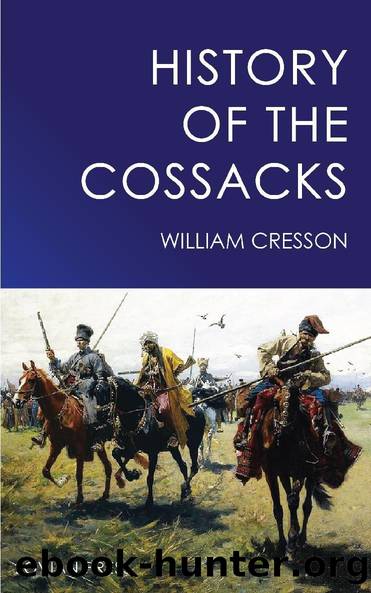History of the Cossacks by William Cresson

Author:William Cresson
Language: eng
Format: epub
Publisher: Jovian Press
THE END OF THE FREE UKRAINE: LITTLE RUSSIA
~
NOT THE LEAST IMPORTANT RESULT of the battle of Poltava was the subjection of the greater part of the Free Ukraine to the will of the Russian crown. Although a majority of the Cossack inhabitants had refused to follow the lead of Mazeppa and might, therefore, have maintained in all fairness their rights to a continuation of the old privileges, the determination of Peter the Great to carry out his unifying reforms soon set definite bounds to the autonomy of the “settlements.”
Even those most loyal to the Russian alliance could not see without sorrow the abrogation of privileges which dated from the days of Bogdan. Moreover, even in the most Russianized districts, the Tsar’s suspicion of these turbulent, half-alien subjects soon led to further vexations and laws restricting their ancient Cossack liberties.
Peter’s first act, after a strong military occupation had secured the imperial hold, was to require of the hetman and the principal Cossack dignitaries an oath of allegiance identical in form to that imposed upon the majority of his subjects. Henceforth the Tsar was legally “Autocrat” and the Ukraine became officially known by the hateful title as “the Province of Little Russia.”
At the same time a demand was made upon each of the Cossack polki or regiments for a contingent of men to be incorporated among the troops of the Russian army. By this means it was clearly indicated that the Cossacks of the Ukraine were now considered liable to regular military service like any other subjects of the empire. This policy also effectually weakened the power of resistance which the regiments furnished by the stanitzi might have opposed to Peter’s “reforms” had they remained at their full strength.
In order to accentuate the changes which the old “Free Cossack” régime had suffered separate courts of justice were established at Joukhoff to administer the new Russian law instead of the old Cossack law based upon the “Institutes of Magdeburg.” The only appeal from this tribunal lay in the courts of the empire and not, as heretofore, in the great Cossack reunions or the Council of Elders of each stanitza.
Meanwhile, in his camp at Bender, sometimes treated by the Turk as a distinguished prisoner, again consulted as an ally, Charles XII continued his intrigues against the Tsar and his vehement appeals to the powers of Europe to be allowed to return to his kingdom.
After the death of Mazeppa, Charles had continued on terms of friendly intimacy with Peter Orlick, who had been elected Hetman of the Zaporogians. The new chief of the former Free Republic was now wholly under the influence of his Turkish patrons. Although such base sycophancy offended the turbulent orthodoxy of his companions, Orlick affected even the dress of the Ottoman protectors. In order to make his position more secure, he also married a Tartar woman chosen in the seraglio of the Khan of the Crimea. His conduct could not fail to widen the breach which already existed between the Zaporogians and the Cossacks of the Ukraine.
Download
This site does not store any files on its server. We only index and link to content provided by other sites. Please contact the content providers to delete copyright contents if any and email us, we'll remove relevant links or contents immediately.
| Military | Political |
| Presidents & Heads of State | Religious |
| Rich & Famous | Royalty |
| Social Activists |
Waking Up in Heaven: A True Story of Brokenness, Heaven, and Life Again by McVea Crystal & Tresniowski Alex(37004)
Empire of the Sikhs by Patwant Singh(22173)
We're Going to Need More Wine by Gabrielle Union(18075)
Hans Sturm: A Soldier's Odyssey on the Eastern Front by Gordon Williamson(16644)
Leonardo da Vinci by Walter Isaacson(11906)
The Radium Girls by Kate Moore(10909)
Educated by Tara Westover(7064)
Tools of Titans by Timothy Ferriss(6950)
How to Be a Bawse: A Guide to Conquering Life by Lilly Singh(6694)
The Last Black Unicorn by Tiffany Haddish(5075)
Permanent Record by Edward Snowden(4999)
The Rise and Fall of Senator Joe McCarthy by James Cross Giblin(4847)
Promise Me, Dad by Joe Biden(4451)
The Wind in My Hair by Masih Alinejad(4425)
The Crown by Robert Lacey(4106)
A Higher Loyalty: Truth, Lies, and Leadership by James Comey(4034)
The Iron Duke by The Iron Duke(3639)
Joan of Arc by Mary Gordon(3260)
How to be Champion: My Autobiography by Sarah Millican(3188)
